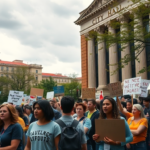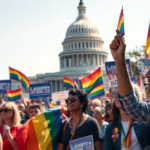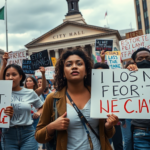Newsom Greenlights LGBTQ+ Hotline Bill Amidst Controversy Over Predator Concerns
In the latest move reflecting California’s progressive legislative agenda, Governor Gavin Newsom has signed a controversial bill aimed at establishing an LGBTQ+ hotline, despite warnings and debates surrounding potential predator risks. The new legislation is set to create a vital resource for LGBTQ+ youth seeking support and guidance in a state recognized for its diverse and inclusive policies.
Supporting the LGBTQ+ Community
The newly approved bill, drafted with the intent of providing a safety net for LGBTQ+ individuals, particularly youths, introduces a state-sponsored hotline to offer mental health support, information on LGBTQ+ rights, and resources for those facing discrimination or violence. The initiative is especially significant for young people, who often face challenges related to acceptance and safety both at home and in educational settings.
State Assembly Member Evan Low, a strong proponent of the bill, emphasized its importance in addressing mental health concerns within marginalized communities. “This hotline is a lifeline for LGBTQ+ youth who often have nowhere else to turn. We are committed to creating a support system that acknowledges and respects their unique experiences,” Low stated.
Community Impact: Support Amid Dilemma
While the bill aims to bolster support for vulnerable individuals, it has sparked a heated debate, with opposition voicing concerns about the potential misuse by predators. Critics warn that without stringent security measures, predators might exploit the system to target unsuspecting minors.
Alicia Hernandez, a parent and activist from Los Angeles, expressed her worries: “While I absolutely support more resources for LGBTQ+ youth, there must be strict protocols to ensure their safety. We can’t open a channel that could potentially be misused.”
Despite these apprehensions, supporters argue that the need for accessible and safe communication channels for LGBTQ+ youth outweighs the risks. The hotline is expected to incorporate advanced safety measures, such as verification checks and trained counselors, to mitigate these concerns.
Historical Context and Ongoing Challenges
LGBTQ+ advocacy groups have long pushed for increased resources and support systems, pointing out gaps in mental health and community services that leave younger residents particularly vulnerable. Statistics repeatedly indicate high levels of mental health issues and suicide rates within the LGBTQ+ community, spotlighting the urgency of such interventions.
California has previously introduced numerous measures to protect and empower its LGBTQ+ population but has faced varied challenges in implementing these effectively. The passage and signing of this bill underscore a consistent effort in rectifying disparities and ensuring equal support for all residents.
Future Implications and Considerations
The introduction of the LGBTQ+ hotline is expected to have broad reaching implications, not just in California but potentially setting a precedent for other states. Policymakers and advocacy groups nationwide closely watch the initiative to assess its effectiveness and impact on community welfare.
Dr. Marie Chen, a sociologist specializing in LGBTQ+ issues at Stanford University, highlighted potential outcomes: “This is a significant step in public policy reflecting societal change. If successful, it might encourage similar initiatives across the country, albeit requiring adaptations to address local community dynamics.”
However, achieving a balance between access and safety continues to be a primary concern. Authors and implementers advocate transparency and a feedback-focused approach to refine operational guidelines continually. Community leaders stress the importance of collaboration between legislators, mental health experts, and the public as this new service unfolds.
Navigating Through Complexity
While welcoming the move, stakeholders acknowledge the complexity of managing an initiative aimed at inclusivity amidst potential risks. Advocates recommend integrating robust data protection and user privacy protocols, drawing parallels with international practices such as the General Data Protection Regulation (GDPR) seen in the European Economic Area (EEA), as a safeguard against misuse.
Community-oriented organizations and helplines like The Trevor Project have offered their expertise in developing operational frameworks predicated on safety and trust. Their experience serves as a critical resource, reflecting a combined effort to maximize benefits while limiting risks.
Resources and Community Engagement
As the state prepares to launch the hotline, residents are encouraged to stay informed and participate in public forums designed to shape its implementation. The California Department of Social Services will be the primary overseer, providing guidance and handling inquiries through various communication channels.
Local advocacy groups and mental health professionals are poised to play vital roles, ensuring the new resource aligns with community needs while prioritizing security and access.
Governor Newsom and the bill’s proponents remain optimistic about the legislation’s promise to empower LGBTQ+ youth. The decision to move forward despite contentious discussions demonstrates an ongoing commitment to fostering a safe, inclusive environment in California where every community member can thrive.







